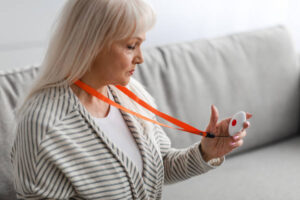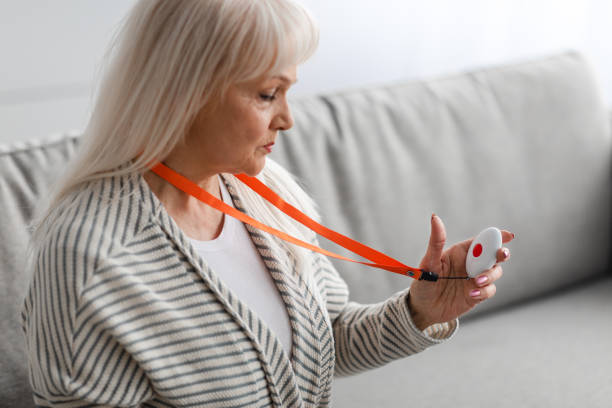Personal Emergency Response Systems (PERS)

Dear Evergreen Nursing Health (ENH) Community,
Today, I want to discuss Personal emergency response and home call systems. In an era where safety and prompt medical assistance are paramount, Personal Emergency Response Systems (PERS) have emerged as a crucial tool for individuals seeking security and peace of mind. These systems, designed to provide instant help in an emergency, have evolved significantly, offering a range of features tailored to various needs. In this blog, we will delve into the workings of PERS and compare some of the leading products in the market, such as Medical Guardian, Mobile Help, MedicAlert, One Call Alert, Life Alert, Medical Alert, Lifeline, and UnaliWear.
How Do Emergency Response Systems Work?
Personal Emergency Response Systems primarily function through a simple yet effective process:
- Activation: The user activates the device in an emergency by pressing a button.
- Connection: The device connects to a response center, often via landline, cellular network, or internet.
- Communication: The user communicates their situation to a trained operator at the response center.
- Assistance: Depending on the situation, the operator dispatches emergency services, contacts family members, or provides other necessary assistance.
The systems are designed for simplicity and ease of use, ensuring that help is just a button-press away.
Comparing At-Home and On-the-Go Devices
1. Medical Guardian
- Type: Both at-home and on-the-go options.
- Features: Fall detection, GPS tracking, water-resistant devices.
- Suitable For: A broad range of users, especially those who are active and require mobility.
2. MobileHelp
- Type: Primarily on-the-go.
- Features: Mobile GPS alert system, two-way communication, no landline required.
- Suitable For: Individuals who are often outside their homes and need protection on the move.3.
3. MedicAlert
- Type: At-home.
- Features: Medical ID bracelets, 24/7 emergency response, health record storage.
- Suitable For: Those with specific medical conditions requiring detailed medical information at hand.
4. One Call Alert
- Type: Both at-home and mobile options.
- Features: Landline and cellular options, fall detection, two-way communication.
- Suitable For: A versatile choice for different lifestyles and needs.
5. Life Alert
- Type: At-home.
- Features: Well-known for the “Help, I’ve fallen and I can’t get up” service, waterproof pendants.
- Suitable For: Elderly individuals primarily staying indoors.
6. Medical Alert
- Type: Both options available.
- Features: No long-term contracts, fall detection, GPS.
- Suitable For: Those seeking flexible plans and straightforward services.
7. Lifeline
- Type: At-home.
- Features: Fall detection, a wide range of at-home devices, medication dispensing service.
- Suitable For: Seniors needing comprehensive at-home monitoring.
8. UnaliWear
- Type: On-the-go.
- Features: Watch-based system, voice-activated medication reminders.
- Suitable For: Tech-savvy seniors and those who prefer a more discreet device.
At Evergreen Nursing Health, we understand that safety, both at home and beyond, is of utmost importance. Discussing Personal Emergency Response Systems (PERS) is crucial, as they are pivotal in ensuring safety and offering prompt assistance during emergencies. Each system is uniquely designed to cater to varying needs and lifestyles. Whether your preference leans towards an at-home system suited for a more sedentary lifestyle or an on-the-go device that complements an active life, there is a PERS tailored for you. Choosing a system that aligns with your lifestyle and offers the peace of mind and security you rightfully deserve is essential.
Yours,
Diana Nelsen, RN BSN
Are you looking to secure either of these services? Schedule a free consultation with our expert nurses today!

Personal Emergency Response Systems (PERS)

Dear Evergreen Nursing Health (ENH) Community,
Today, I want to discuss Personal emergency response and home call systems. In an era where safety and prompt medical assistance are paramount, Personal Emergency Response Systems (PERS) have emerged as a crucial tool for individuals seeking security and peace of mind. These systems, designed to provide instant help in an emergency, have evolved significantly, offering a range of features tailored to various needs. In this blog, we will delve into the workings of PERS and compare some of the leading products in the market, such as Medical Guardian, Mobile Help, MedicAlert, One Call Alert, Life Alert, Medical Alert, Lifeline, and UnaliWear.
How Do Emergency Response Systems Work?
Personal Emergency Response Systems primarily function through a simple yet effective process:
- Activation: The user activates the device in an emergency by pressing a button.
- Connection: The device connects to a response center, often via landline, cellular network, or internet.
- Communication: The user communicates their situation to a trained operator at the response center.
- Assistance: Depending on the situation, the operator dispatches emergency services, contacts family members, or provides other necessary assistance.
The systems are designed for simplicity and ease of use, ensuring that help is just a button-press away.
Comparing At-Home and On-the-Go Devices
1. Medical Guardian
- Type: Both at-home and on-the-go options.
- Features: Fall detection, GPS tracking, water-resistant devices.
- Suitable For: A broad range of users, especially those who are active and require mobility.
2. MobileHelp
- Type: Primarily on-the-go.
- Features: Mobile GPS alert system, two-way communication, no landline required.
- Suitable For: Individuals who are often outside their homes and need protection on the move.3.
3. MedicAlert
- Type: At-home.
- Features: Medical ID bracelets, 24/7 emergency response, health record storage.
- Suitable For: Those with specific medical conditions requiring detailed medical information at hand.
4. One Call Alert
- Type: Both at-home and mobile options.
- Features: Landline and cellular options, fall detection, two-way communication.
- Suitable For: A versatile choice for different lifestyles and needs.
5. Life Alert
- Type: At-home.
- Features: Well-known for the “Help, I’ve fallen and I can’t get up” service, waterproof pendants.
- Suitable For: Elderly individuals primarily staying indoors.
6. Medical Alert
- Type: Both options available.
- Features: No long-term contracts, fall detection, GPS.
- Suitable For: Those seeking flexible plans and straightforward services.
7. Lifeline
- Type: At-home.
- Features: Fall detection, a wide range of at-home devices, medication dispensing service.
- Suitable For: Seniors needing comprehensive at-home monitoring.
8. UnaliWear
- Type: On-the-go.
- Features: Watch-based system, voice-activated medication reminders.
- Suitable For: Tech-savvy seniors and those who prefer a more discreet device.
At Evergreen Nursing Health, we understand that safety, both at home and beyond, is of utmost importance. Discussing Personal Emergency Response Systems (PERS) is crucial, as they are pivotal in ensuring safety and offering prompt assistance during emergencies. Each system is uniquely designed to cater to varying needs and lifestyles. Whether your preference leans towards an at-home system suited for a more sedentary lifestyle or an on-the-go device that complements an active life, there is a PERS tailored for you. Choosing a system that aligns with your lifestyle and offers the peace of mind and security you rightfully deserve is essential.
Yours,
Diana Nelsen, RN BSN
Are you looking to secure either of these services? Schedule a free consultation with our expert nurses today!

